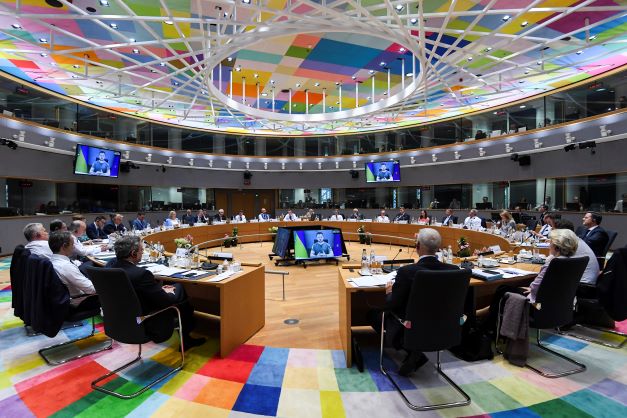The European council on Thursday granted candidate status to Ukraine and Moldova, recognised the European perspective of Georgia, declared that it is ready to grant candidate status to Bosnia and Herzegovina but failed again to decide on launching accession negotiations with Albania and North Macedonia that have been candidate countries for years.
Western Balkans countries expressed frustration and disappointment about the lack of progress in their enlargement process and threatened even at some point not to attend the EU-Western Balkans meeting which took place on Thursday morning before the Council meeting. A planned press conference with EU leaders was cancelled in the last minute.
The EU member state which is blocking the opening of negotiations with North Macedonia over issues of historical narratives and language rights is its neighbour Bulgaria, a member state since 2007, which is in the middle of a government crisis and is heading for new elections.
Albania’s Prime Minister Edi Rama complained bitterly that Albania and North Macedonia have been taken hostages by Bulgaria, without the EU being able to liberate them. “Enlargement has gone from a shared vision of community to a kidnapping vehicle of individual states,” he added.
The foreign affairs committee of the Bulgarian parliament passed yesterday a draft decision approving the French Presidency compromise to lift its veto to start accession talks but it needs to be approved in plenary by the parliament. The draft resolution stops short of recognizing the Macedonian language, according to reporting by Euractiv.
Asked about the enlargement process in the Western Balkans, EU’s foreign policy chief Josep Borrell could not hide his disappointment. “My disappointment, I suppose, is the disappointment of many people. We should be launching this. But there is still hope – I do not know what the Bulgarian parliament can do in the next hours. But things are not going well, and we should try to mend it.”
He added that that unanimity in decision making is a “big problem” in the EU. “We have to think how we take decisions in the EU, because we cannot continue with a single country blocking for months and months.”
As already reported, EU leaders discussed a proposal to launch a so-called European political community, proposed by French President Emmanuel Macron. It was presented under the headline ‘Wider Europe’ with the aim to offer a platform for political coordination to countries in Europe with which the EU has close relations.
At the concluding press conference President Macron explained that it was mainly intended as an interim solution for the Western Balkans countries as their accession process is dragging on. We need a neighbourhood which is part of us, he explained. We cannot leave a strategic vacuum. We can live on the same street if not in the same house, he explained the idea.
However, the issue which dominated the Council summit and overshadowed any differences of opinion was Ukraine. Besides granting Ukraine candidate status, several points on the agenda dealt with military, economic and political support to Ukraine. European Commission President Ursula von der Leyen was pleased that the Council had endorsed the Cmmission's opinion on Ukraine’s EU application.
She cautioned that Ukraine and Moldovia will “have to do their homework.” The Council invited the European Commission to report to it on the fulfilment of the conditions specified in the Commission’s opinions on their respective membership applications. “The Council will decide on further steps once all of these conditions are fully met”.
“The decision to grant Ukraine candidate status is a vitally important step towards securing Ukraine’s long-term future,” commented John Lough, an expert on Ukraine and associate fellow at the Russia & Eurasia Programme at Chatham House. “At this stage of the war, it is an important morale booster for the government and the population at large since it shows that Ukraine’s sacrifices are not in vain.”
“The devil will be in the detail when Ukraine reaches the point where it can resume its reforms and start meeting accession criteria. This process is likely to take many years but the need to re-build the country after this devastating war will provide excellent opportunities to accelerate key reforms, particularly in the areas of governance and rule of law.”
Piotr Kulpa, a former Polish minister with experience of Poland’s accession process, told The Brussels Times that Ukraine’s EU orientation has been strong for years and even included in the reform of its constitution before the war. But he cautioned that the political future of Ukraine will also be determined by a solution to its security and that the role of the US is crucial.
Candidate country status is no guarantee for fast EU membership, he added. It is essentially a technical vehicle for support to Ukraine but it is hardly possible to achieve actual EU membership in the visible future.
Everyone agrees that the Council's decision on granting Ukraine candidate statues sends a strong political signal to Ukraine, fighting for its future as an independent and democratic country, but no-one seems to know what kind of signal it sends to Russia or how it will react to the decision.
M. Apelblat
The Brussels Times

